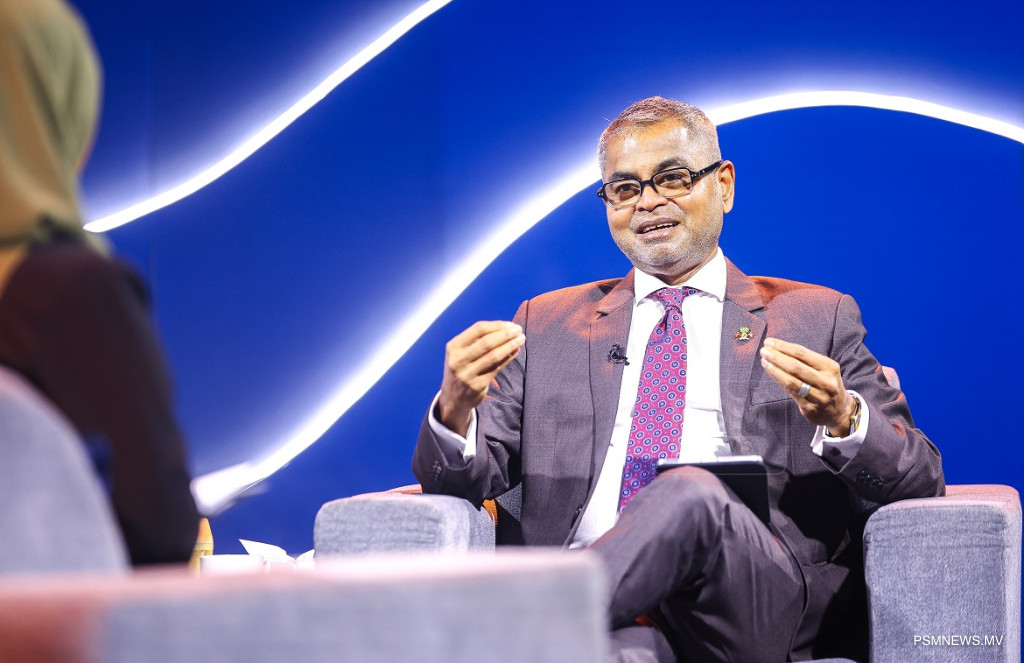Tourism Growth and Ecological Resilience at Centre of President Muizzu’s Agenda, Minister Thoriq Confirms

The government of President Dr Mohamed Muizzu is advancing ambitious infrastructure and environmental programmes intended to strengthen the Maldives’ position as a premier global tourist destination while addressing ecological sustainability, according to Minister of Tourism and Environment Thoriq Ibrahim.
In recent remarks on PSM News’ ‘Hafuthaa 104’ programme, the Minister Thoriq highlighted progress on two fronts: the full operationalisation of Velana International Airport’s (VIA) new passenger terminal and the rapid expansion of a nationwide tree‑planting campaign.
From airport upgrades to Halal tourism, Maldives seeks sector transformation
Tourism growth is closely tied to modernising the country’s principal gateway. Minister Thoriq confirmed that completing and opening the new passenger terminal, inaugurated in July this year, has been a central priority for the government. He expressed confidence that the facility will soon be fully prepared to manage international traffic, with work under way to transition all international airlines into the new structure.
He anticipates that all international flights will begin serving passengers from the new terminal by the end of the year, describing the development as a decisive step forward for Maldivian tourism. “I am confident that by the conclusion of this year, operations will be underway such that all arriving international flights will be served through the new terminal,” Minister Thoriq assured. “This constitutes major progress for the tourism sector of the Maldives.”
The government has also intensified efforts to expand and diversify tourism nationwide. Within two years of the current administration, capacity has grown by 6,223 new beds. In 2025 alone, 122 new facilities were registered, comprising two resorts, one tourist hotel, 87 guesthouses, 20 homestay guesthouses, and 12 tourist vessels. President Muizzu has prioritised development in regions historically underserved, including Haa Alifu, Haa Dhaalu, Shaviyani, Thaa, and Laamu Atolls, as well as Addu City.
To encourage investment in these areas, the Tourism Ministry has introduced substantial concessions. Minister Thoriq reported that approximately 42 islands have been opened under these schemes. Among them is the introduction of Halal tourism, a new concept for the Maldives, with six islands designated for this purpose, one of which has already been awarded. Additionally, 17 islands were opened via Open Bidding, resulting in two awards and one contract signed, while 19 islands were opened through Closed Bidding, yielding six awards and two contracts signed.
Tree‑planting drive aims to reshape Maldives’ ecological future
Alongside tourism expansion, the government is pursuing ambitious environmental goals. The ministry is implementing the Five Million Tree Planting Programme, announced by President Muizzu to restore endangered species, expand greenery, and reinforce ecological systems. Minister Thoriq confirmed that the initiative is advancing steadily. Although early progress was slowed by limited nursery capacity, significant milestones are now being reached. The minister projected that one million trees will be planted before the end of this year. To date, 819,000 trees have been planted across the Maldives.

The long‑term target is to strengthen the programme in the coming year and ensure the successful planting of five million trees by 2028. “We plan to strengthen the programme further next year, and we will successfully complete the initiative to plant five million trees by 2028,” Minister Thoriq said. “Furthermore, one million trees will be entirely planted and finalised before the close of the current year.”
To address nursery constraints, the ministry signed an agreement this month with the Housing Development Corporation (HDC) to establish two specialised nurseries in Gan, Laamu Atoll, measuring 20,000 and 100,000 square feet. In addition, under Chinese government grant aid, preparations are under way for a 55,000 square foot nursery in Hulhumalé Phase II.
The initiative has extended beyond government‑led projects. Minister Thoriq noted that at least two teak saplings have been planted on every island nationwide. Resorts have also pledged to plant 1.4 million trees, underscoring broad‑based commitment to the country’s environmental objectives.
